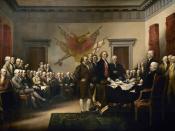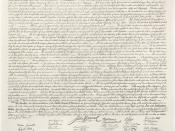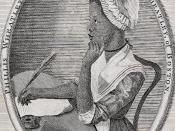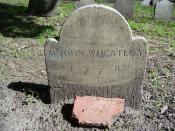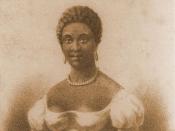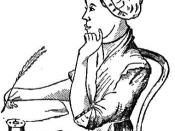AUTHORS OF THE REVOLUTION By the American Revolution, the thirteen colonies had become well-established, harmonious settlements. Until this time, the colonies had calmly coexisted under the rule of the mother country, England. However, after many tense months between the settlers and the English government, England's Parliament decided to place various, new regulations on the colonists such as unjust, severe taxes and limitations on shipping rights. Feeling as though many of these new policies endangered their valuable liberties, the American people elected that it was time for a change. These circumstances fueled writers such as Thomas Paine, Phillis Wheatley, and Thomas Jefferson to articulate the revolutionary spirit that, sweeping across the emerging nation, inspired the colonists to battle for independence.
Thomas Paine discusses the American spirit in his "The Crisis, Number 1". In this piece, Paine specifically states that the era of the revolution tests men's resolve and is a time that "tries mens' soulsâ¦but he that stands it now deserves the love and thanks of man and woman."
Through his writing, Pain tries to persuade Americans to join the struggle against Britain. He understands their common desire for freedom and that it coexists with their concern of defeat. However, he argues, if they "show" their "faith by their worksâ¦God may bless" and protect them. Another approach used notably during the eighteenth century was spiritual petition. The colonists did not yet have a strong central government to unify them and the deep-seated fear was that if independence was won, chaos would break loose. Yet, if their Creator supported separation from England, He would prevent such chaos and ensure the security of the free nation.
Phillis Wheatley similarly used religious appeal in his colonial-period writing to express the new, American intent to seek freedom. In "To His Excellency, General Washington," Wheatley wrote a poem focusing on "the land of freedom's heaven-defended race!" Through the rhyme's entirety, Wheatley personifies America as the goddess Columbia. America's ethics and values are weaved into the physical attributes of the deity. Wheatley even declares that if the colonists "let the goddess guide" their "ev'ry actionâ¦with gold unfading, WASHINGTON!" will be theirs. Wheatley requests his audience to have faith in the revolution in order for it to realize success.
The preeminent example of the colonial American spirit is found in Thomas Jefferson's "The Declaration of Independence". This document defines the revolutionary ideals "that all men are created equal" and "that they are endowed by their Creator" with the rights to "life, liberty, and the pursuit of happiness." Jefferson wrote this manuscript to assist Americans in establishing a form of central government-and he succeeded. Many Americans gave "support of this declaration" and did "mutually pledge to each other" their "lives..fortunes" and their "sacred honor".
Without the heartening literature of authors like Thomas Paine, Phillis Wheatley, and Thomas Jefferson, America's independence might not have been essential enough to the masses to fight for. It was through the writing of the time that the revolutionary spirit was spread. Colonists had prevalent fears about their battle for independence, and the need for uplifting literature was intense. Due to the valor and insight of their works, the American authors of the eighteenth century have earned themselves a place in the history books-and of course the literature texts too.
